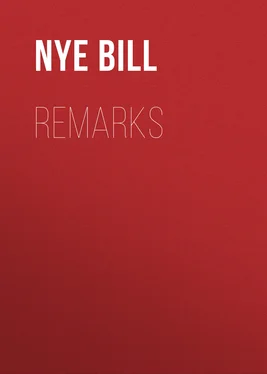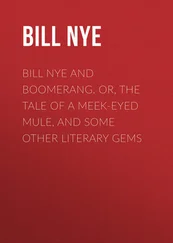Bill Nye - Remarks
Здесь есть возможность читать онлайн «Bill Nye - Remarks» — ознакомительный отрывок электронной книги совершенно бесплатно, а после прочтения отрывка купить полную версию. В некоторых случаях можно слушать аудио, скачать через торрент в формате fb2 и присутствует краткое содержание. Жанр: foreign_humor, foreign_antique, foreign_prose, на английском языке. Описание произведения, (предисловие) а так же отзывы посетителей доступны на портале библиотеки ЛибКат.
- Название:Remarks
- Автор:
- Жанр:
- Год:неизвестен
- ISBN:нет данных
- Рейтинг книги:4 / 5. Голосов: 1
-
Избранное:Добавить в избранное
- Отзывы:
-
Ваша оценка:
- 80
- 1
- 2
- 3
- 4
- 5
Remarks: краткое содержание, описание и аннотация
Предлагаем к чтению аннотацию, описание, краткое содержание или предисловие (зависит от того, что написал сам автор книги «Remarks»). Если вы не нашли необходимую информацию о книге — напишите в комментариях, мы постараемся отыскать её.
Remarks — читать онлайн ознакомительный отрывок
Ниже представлен текст книги, разбитый по страницам. Система сохранения места последней прочитанной страницы, позволяет с удобством читать онлайн бесплатно книгу «Remarks», без необходимости каждый раз заново искать на чём Вы остановились. Поставьте закладку, и сможете в любой момент перейти на страницу, на которой закончили чтение.
Интервал:
Закладка:
Knights of the Pen
When you come to think of it, it is surprising that so many newspaper men write so that any one but an expert can read it. The rapid and voluminous work, especially of daily journalism, knocks the beautiful business college penman, as a rule, higher than a kite. I still have specimens of my own handwriting that a total stranger could read.
I do not remember a newspaper acquaintance whose penmanship is so characteristic of the exacting neatness and sharp, clear cut style of the man, as is that of Eugene Field, of the Chicago News . As the “Nonpareil Writer” of the Denver Tribune , it was a mystery to me when he did the work which the paper showed each day as his own. You would sometimes find him at his desk, writing on large sheets of “print paper” with a pen and violet ink, in a hand that was as delicate as the steel plate of a bank note and the kind of work that printers would skirmish for. He would ask you to sit down in the chair opposite his desk, which had two or three old exchanges thrown on it. He would probably say, “Never mind those papers. I’ve read them. Just sit down on them if you want to.” Encouraged by his hearty manner, you would sit down, and you would continue to sit down till you had protruded about three-fourths of your system through that hollow mockery of a chair. Then he would run to help you out and curse the chair, and feel pained because he had erroneously given you the ruin with no seat to it. He always felt pained over such things. He always suffered keenly and felt shocked over the accident until you had gone away, and then he would sigh heavily and “set” the chair again.
Frank Pixley, the editor of the San Francisco Argonaut , is not beautiful, though the Argonaut is. He is grim and rather on the Moses Montefiore style of countenance, but his hand-writing does not convey the idea of the man personally, or his style of dealing with the Chinese question. It is rather young looking, and has the uncertain manner of an eighteen-year-old boy.
Robert J. Burdette writes a small but plain hand, though he sometimes suffers from the savage typographical error that steals forth at such a moment as ye think not, and disfigures and tears and mangles the bright eyed children of the brain.
Very often we read a man’s work and imagine we shall find him like it, cheery, bright and entertaining; but we know him and find that personally he is a refrigerator, or an egotist, or a man with a torpid liver and a nose like a rose geranium. You will not be disappointed in Bob Burdette, however, You think you will like him, and you always do. He will never be too famous to be a gentleman.
George W. Peck’s hand is of the free and independent order of chirography. It is easy and natural, but not handsome. He writes very voluminously, doing his editorial writing in two days of the week, generally Friday and Saturday. Then he takes a rapid horse, a zealous bird dog and an improved double barrel duck destroyer and communes with nature.
Sam Davis, an old time Californian, and now in Nevada, writes the freest of any penman I know. When he is deliberate, he may be betrayed into making a deformed letter and a crooked mark attached to it, which he characterizes as a word. He puts a lot of these together and actually pays postage on the collection under the delusion that it is a letter, that it will reach its destination, and that it will accomplish its object.
He makes up for his bad writing, however, by being an unpublished volume of old time anecdotes and funny experiences.
Goodwin, of the old Territorial Enterprise , and Mark Twain’s old employer, writes with a pencil in a methodical manner and very plainly. The way he sharpens a “hard medium” lead pencil and skins the apostle of the so-called Church of Jesus Christ of Latter Day Saints, makes my heart glad. Hardly a day passes that his life is not threatened by the low browed thumpers of Mormondom, and yet the old war horse raises the standard of monogamy and under the motto, “One country, one flag and one wife at a time,” he smokes his old meerschaum pipe and writes a column of razor blades every day. He is the buzz saw upon which polygamy has tried to sit. Fighting these rotten institutions hand to hand and fighting a religious eccentricity through an annual message, or a feeble act of congress, are two separate and distinct things.
If I had a little more confidence in my longevity than I now have, I would go down there to the Valley of the Jordan, and I would gird up my loins, and I would write with that lonely warrior at Salt Lake, and with the aid and encouragement of our brethren of the press who do not favor the right of one man to marry an old woman’s home, we would rotten egg the bogus Temple of Zion till the civilized world, with a patent clothes pin on its nose, would come and see what was the matter.
I see that my zeal has led me away from my original subject, but I haven’t time to regret it now.
The Wild Cow
When I was young and used to roam around over the country, gathering water-melons in the light of the moon, I used to think I could milk anybody’s cow, but I do not think so now. I do not milk a cow now unless the sign is right, and it hasn’t been right for a good many years. The last cow I tried to milk was a common cow, born in obscurity; kind of a self-made cow. I remember her brow was low, but she wore her tail high and she was haughty, oh, so haughty.
I made a common-place remark to her, one that is used in the very best of society, one that need not have given offence anywhere. I said “So”—and she “soed.” Then I told her to “hist” and she histed. But I thought she overdid it. She put too much expression in it.
Just then I heard something crash through the window of the barn and fall with a dull, sickening thud on the outside. The neighbors came to see what it was that caused the noise. They found that I had done it in getting through the window.
I asked the neighbors if the barn was still standing. They said it was. Then I asked if the cow was injured much. They said she seemed to be quite robust. Then I requested them to go in and calm the cow a little, and see if they could get my plug hat off her horns.
I am buying all my milk now of a milkman. I select a gentle milkman who will not kick, and feel as though I could trust him. Then, if he feels as though he could trust me, it is all right.
Spinal Meningitis
So many people have shown a pardonable curiosity about the above named disease, and so few have a very clear idea of the thrill of pleasure it affords the patient, unless they have enjoyed it themselves, that I have decided to briefly say something in answer to the innumerable inquiries I have received.
Up to the moment I had a notion of getting some meningitis, I had never employed a physician. Since then I have been thrown in their society a great deal. Most of them were very pleasant and scholarly gentlemen, who will not soon be forgotten; but one of them doctored me first for pneumonia, then for inflammatory rheumatism, and finally, when death was contiguous, advised me that I must have change of scene and rest.
I told him that if he kept on prescribing for me, I thought I might depend on both. Change of physicians, however, saved my life. This horse doctor, a few weeks afterward, administered a subcutaneous morphine squirt in the arm of a healthy servant girl because she had the headache, and she is now with the rest of this veterinarian’s patients in a land that is fairer than this.
She lived six hours after she was prescribed for. He gave her change of scene and rest. He has quite a thriving little cemetery filled with people who have succeeded in cording up enough of his change of scene and rest to last them through all eternity. He was called once to prescribe for a man whose head had been caved in by a stone match-box, and, after treating the man for asthma and blind staggers, he prescribed rest and change of scene for him, too. The poor asthmatic is now breathing the extremely rarified air of the New Jerusalem.
Читать дальшеИнтервал:
Закладка:
Похожие книги на «Remarks»
Представляем Вашему вниманию похожие книги на «Remarks» списком для выбора. Мы отобрали схожую по названию и смыслу литературу в надежде предоставить читателям больше вариантов отыскать новые, интересные, ещё непрочитанные произведения.
Обсуждение, отзывы о книге «Remarks» и просто собственные мнения читателей. Оставьте ваши комментарии, напишите, что Вы думаете о произведении, его смысле или главных героях. Укажите что конкретно понравилось, а что нет, и почему Вы так считаете.












